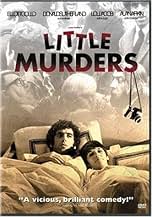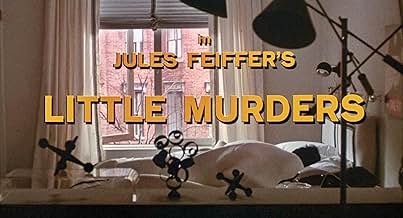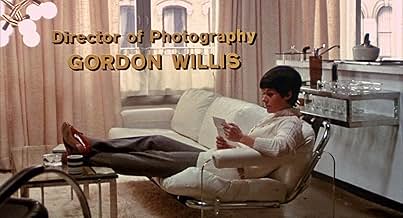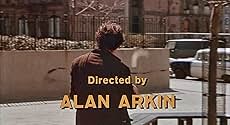Un giovane nichilista de la città di New York alle prese di una pervasiva violenza urbana, telefonate oscene, tubi dell'acqua arrugginiti, blackout elettrici, paranoia e conflitti etnici e r... Leggi tuttoUn giovane nichilista de la città di New York alle prese di una pervasiva violenza urbana, telefonate oscene, tubi dell'acqua arrugginiti, blackout elettrici, paranoia e conflitti etnici e razziali durante una tipica estate degli anni '70.Un giovane nichilista de la città di New York alle prese di una pervasiva violenza urbana, telefonate oscene, tubi dell'acqua arrugginiti, blackout elettrici, paranoia e conflitti etnici e razziali durante una tipica estate degli anni '70.
- Premi
- 1 candidatura in totale
- Checkpoint Police Officer
- (non citato nei titoli originali)
Recensioni in evidenza
I saw this film and then read the play it was based on, and both give off the same claustrophobic air of desperation while still being side-splittingly funny. It is definitely worth hunting down. In the words of Father Dupas, it is "all right."
While I found it less funny during a recent viewing than I remembered, the message was still disturbing and contemporary. It is certainly satire and black comedy, but you often lose yourself in the story. It is a very individual film, different people will laugh at different times and at different things. During a theater viewing it seemed to isolate audience members from each other.
Jules Feiffer's screenplay is about Alfred (Elliot Gould), a NYC photographer and self- described "apathist", sort of an unengaged existentialist. He is completely disillusioned and has deadened himself to the cries, smells, sights and pains of violent city living; in a Big Apple even more adversarial than that of "The Out-Of-Towners".
Alfred can't feel much anymore but he takes an interest in Patsy (Marcia Rodd), a controlling interior decorator optimist, who wants to change him. Patsy has been able to stay upbeat and involved despite daily encounters with muggers, snipers, obscene callers, and a family that leaves a lot to be desired.
The film seems to be saying that harsh urban life cuts its people off from gentler human emotion. As an interior decorator Patsy's life is largely defined by her ability to control her possessions and the attitudes of those around her.
Patsy's father, mother and younger brother are living a painful parody of "family life," and Alfred's weirdness eventually allows him to fit right in. The dinner scene where he first meets her family is one of the funniest in film history.
The film illustrates that neither apathy nor constructive engagement are successful mechanisms for coping with the modern world. It seems to be saying that the only rational response to living in an insane environment is to vigorously participate in the insanity.
Then again, what do I know? I'm only a child.
The backdrop is an increasingly violent NYC in which property is randomly vandalized more than robbed, people are at first attacked - the way that Alfred was - and then random shootings/murders by unnamed snipers begin. Patsy's family of origin are like an educated version of The Bunkers on All In the Family. Eventually they have steel panels installed on their windows so that the snipers will not shoot into their apartment.
Alan Arkin plays a cop driven mad by all of the homicides in which the victims come from every walk, age, and ethnicity and none of them apparently knew their assailants.
Donald Sutherland has a small but memorable role as pastor of the First Existential Church who is able to grant Alfred and Patsy's request that the name of the deity not be mentioned in their wedding ceremony. His sermon - and he airs everybody's dirty linen at this time, apparently not believing in the confidentiality of the clergy - during that service starts a free-for-all fist fight.
The film has a very tie-dyed feel about it that is distinctively early 70s, yet how it deals with all of the random violence, particulary the frightening origin of the random killings in the final scene, seems all too "ripped from the headlines".
Lo sapevi?
- QuizAfter seeing the film, Jean Renoir wrote to Alan Arkin, telling him "this film will never be forgotten".
- Citazioni
Rev. Dupas: Why does one decide to marry? Social pressure? Boredom? Loneliness? Sexual appeasement? Love? I won't put any of these reasons down. Each in its own way is adequate, each is all right. Last year, I married a musician who wanted to get married in order to stop masturbating. Please, don't be startled, I'm not putting him down. That marriage did not work. But the man tried. He is now separated, still masturbating, but he is at peace with himself because he tried society's way.
- Versioni alternativeOriginally rated 'R' when released in the U.S in 1971. In 1973 the film was cut to be re-rated 'PG' for a re-release.
- ConnessioniFeatured in Alan Arkin: Live from the TCM Classic Film Festival (2015)
- Colonne sonoreSkating In Central Park
Composed by John Lewis
Performed by The Modern Jazz Quartet
Through the courtesy of United Artists Records, Inc.
I più visti
- How long is Little Murders?Powered by Alexa
Dettagli
- Data di uscita
- Paese di origine
- Sito ufficiale
- Lingua
- Celebre anche come
- Little Murders
- Luoghi delle riprese
- Brooklyn Boro Hall Court, New York, New York, Stati Uniti(courtroom sequence)
- Aziende produttrici
- Vedi altri crediti dell’azienda su IMDbPro
Botteghino
- Budget
- 1.340.000 USD (previsto)
- Tempo di esecuzione1 ora 48 minuti
- Colore
- Proporzioni
- 1.85 : 1































